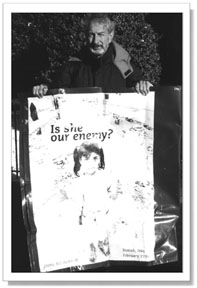|
By
Silja J. A. Talvi
Growing up as a Jew in Boston in the '40s, Bert Sacks overheard many anxious conversations about the Holocaust. The experience left a profound impression. "I
|
|
|
Bert Sacks |
used to hear, 'Where were all the good Germans? Why didn't they help the Jews?' " he recalls. "I would wonder what I would have done if I had been born Christian and German during that time. Would I have had the courage to help?"
Sacks, a 57-year-old software engineer from Seattle, is staying in a Catholic church in Washington, D.C., several weeks into a month-long fast. He and nine other members of Voices in the Wilderness, a Chicago- based humanitarian group (www.nonviolence.org/vitw), began the fast on January 15, a date which marks both the birthday of Martin Luther King Jr. and the ninth anniversary of the begining of the Gulf War.
Though Sacks had no background in civil disobedience and had sat out the protests of the '60s and '70s, he was outraged by the television coverage of Operation Desert Storm in 1991, the pandemic anti-Arab sentiment the war fostered, and the widespread indifference of so many Americans to the killing of Iraqi civilians. "That, more than the war itself, shocked me deeply," he says.
![]()
|
In These Times ©
2000
Volume 24, Number 7 |

